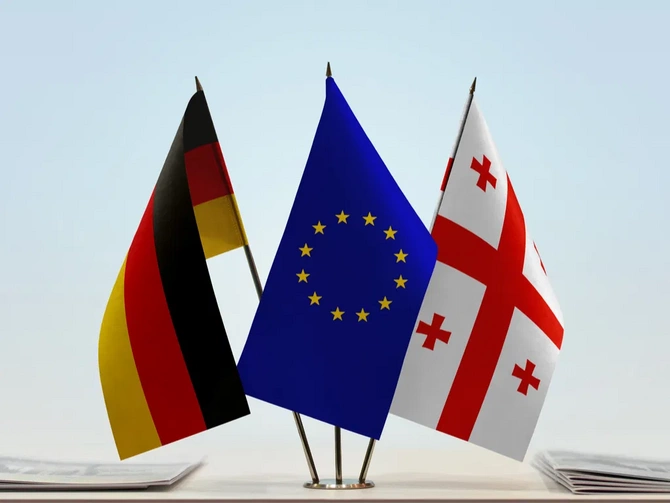
By Asif Aydinly
Amid escalating tensions between the United States and the Georgian government, and on the eve of municipal elections, the political landscape in Tbilisi remains highly charged.
The recent warnings issued by the U.S. Embassy about potential bomb threats targeting major shopping malls in the capital triggered a sharp response from the Georgian authorities, who condemned the statement as interference in the country’s internal affairs. Meanwhile, the ruling Georgian Dream party underwent a leadership reshuffle that further consolidated the position of Prime Minister Irakli Kobakhidze, who now heads both the government and the party. Against this backdrop, Georgia’s foreign policy direction is also being actively discussed, including the prospects for dialogue with Germany’s new government led by Chancellor Friedrich Merz.
In an interview with The Caspian Post, prominent Georgian political analyst Gia Kuchava shared his insights on the latest developments, the balance of power within the ruling party, the opposition’s chances in the upcoming elections, and the future of Georgian-German relations.

- Recently, the U.S. Embassy in Georgia issued a statement warning of potential bomb threats at three shopping malls in Tbilisi. Shortly afterward, Georgia’s State Security Service (SSG) criticized the diplomatic mission, urging it to refrain from making unverified public statements on security matters. In your opinion, why did the U.S. Embassy choose to announce this information publicly instead of communicating it directly to Georgian security services?
Photo credit: mtavari.tv
It is worth recalling the terrorist attack at Moscow’s Crocus City Hall in March 2024. At the time, it was reported that the U.S. Embassy had provided advance warning to Russian security services, yet, according to official accounts, no preventive measures were taken. It is possible that in Tbilisi’s case, the U.S. side similarly informed Georgia’s State Security Service about a potential threat but considered the response from the Georgian authorities inadequate. This may explain why the embassy chose to make a public statement, explicitly naming East Point, Galleria Tbilisi, and Tbilisi Mall.
Georgia’s State Security Service, in turn, announced that it was investigating what it described as another instance of false information and called on all diplomatic missions accredited in Georgia to exercise responsibility and coordinate such statements with the relevant state agencies.
It is important to understand that for the United States, the safety of its citizens is a top priority, regardless of where they are in the world. Therefore, I would not rule out that the statement was also aimed at potential perpetrators of the alleged attack, signaling that the U.S. is aware of the threat and prepared to act.
On May 8, as reported by Georgia’s Public Broadcaster, the U.S. Embassy lifted its advisory to avoid visiting the specified areas.
- At the recent Georgian Dream party congress, Prime Minister Irakli Kobakhidze was elected party chairman. The party has set its sights on winning the upcoming municipal elections. How do you assess its chances?
Getty images
There are three key figures within the party-former Prime Minister Irakli Garibashvili, current Prime Minister Irakli Kobakhidze, and Tbilisi Mayor Kakha Kaladze. However, the true leader remains the party’s founder, Bidzina Ivanishvili, who makes the party’s strategic decisions.
Garibashvili’s resignation as party chairman has strengthened Kobakhidze’s position, as he now leads both the government and the ruling party. The party appears to be united, although there is some internal rivalry with Kaladze, who enjoys greater popularity among Tbilisi residents compared to Kobakhidze.
The recent reshuffle has further consolidated Kobakhidze’s power. However, I do not rule out the possibility that Garibashvili’s departure was a temporary, coordinated move with Ivanishvili. It is quite possible that in the future, Garibashvili could establish a new party to contest the 2028 parliamentary elections, allowing Ivanishvili to control not only Georgian Dream but also the People’s Power movement and potentially Garibashvili’s new party.
As for the municipal elections, Georgian Dream’s chances appear strong. The radical opposition has announced a boycott, demanding snap parliamentary elections. However, the parties of Giorgi Gakharia and Mamuka Khazaradze are actively preparing for the vote. Given the lack of a united opposition front, the ruling party has every chance to secure victories in most municipalities.
- What are the opposition’s prospects?
Municipal elections have traditionally posed more challenges for the opposition than parliamentary contests. After the results of the 2024 elections, it was evident that in major cities such as Tbilisi, Kutaisi, and Batumi, the opposition could have posed a serious challenge-provided they had rallied around a single candidate. However, at this point, the opposition remains fragmented.
Gakharia’s and Khazaradze’s parties are preparing for the elections, while the radical opposition continues its boycott. At the same time, non-parliamentary parties are unlikely to present any serious competition. Even if the radical opposition reverses its decision, in smaller municipalities the ruling party and its nominal allies are still likely to have the upper hand.
- Following the appointment of Friedrich Merz as Germany’s Chancellor, Prime Minister Kobakhidze expressed hope for a "reset" in relations with Berlin. How realistic is this?
Photo credit:.strategeast.org
Merz indeed supports the European Union’s enlargement and has previously mentioned Georgia in his statements. However, it should be noted that his government was formed through a fragile coalition that includes the Social Democrats, who have taken a more critical stance toward Tbilisi.
Any bold moves in favor of Georgia could deepen internal divisions within the coalition and potentially threaten its stability. Therefore, without concrete steps from the Georgian government, one should not expect Berlin to soften its policy toward Tbilisi. At present, Prime Minister Kobakhidze has shown little willingness to make compromises, making the prospect of a genuine "reset" in relations unlikely.
Share on social media